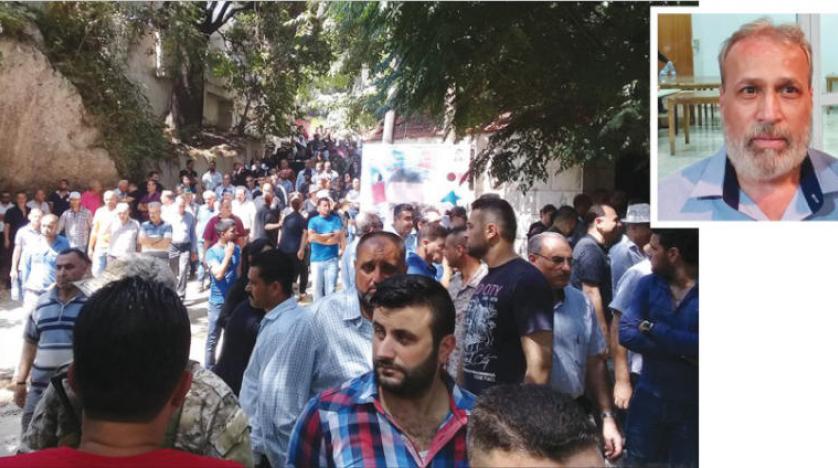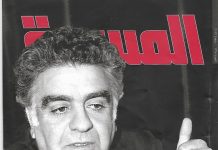اغتيال {كاتم أسرار} صواريخ إيران في سوريا ومخترع البراميل المتفجرة
من الشخصيات العسكرية القليلة التي حازت ثقة {الحرس الثوري} و«حزب الله» والروس معاً
طرطوس (سوريا):: االشرق الأوسط» تل أبيب: نظير مجلي//06 آب/18
شيعت بلدة وادي العيون، بريف حماة الغربي، جنوب منطقة الغاب، أمس (الأحد)، مدير البحوث العلمية في مصياف، عزيز علي إسبر، الذي قضى في حادث تضاربت الأنباء حوله. ففي حين أكدت مصادر محلية أنه تم زرع عبوة ناسفة بسيارته انفجرت في الـ11 مساء السبت، اتهمت الصفحات الإعلامية الموالية الموساد الإسرائيلي باغتيال أحد أهم الشخصيات العسكرية العلمية، مشيرة إلى أن الموساد كان يتعقب عزيز إسبر في مدينة طرطوس، حيث يقيم، وفي مقر عمله بمركز بحوث مصياف، وأن الأجهزة الأمنية أحبطت عملية اغتياله عدة مرات.
وأفاد «المرصد السوري لحقوق الإنسان» بمقتل «مدير مركز البحوث العلمية، عزيز إسبر، في انفجار استهدف سيارته في مدينة مصياف، في ريف حماة، وسط سوريا، ليل السبت».
ولم يتمكن المرصد من تحديد «ما إذا كان الانفجار ناجماً عن عبوة مزروعة بالسيارة، أم على الطريق وتم تفجيرها عن بعد».
ومن جانبها، اتهمت وسائل إعلام إيرانية إسرائيل بالوقوف وراء العملية، بينما صمتت وسائل الإعلام الرسمية في سوريا عن نشر الخبر، واكتفت صحيفة «الوطن»، المحلية المقربة من النظام، بنشر خبر مقتضب، أكدت فيه أن «إسبر وسائقه قتلا بزرع عبوة ناسفة في سيارتهما»، وألمحت إلى تورط إسرائيل بالعملية.
وفي إسرائيل، كالعادة، تجاهلت الحكومة والجيش وبقية أجهزة الأمن الاتهامات بأنها تقف وراء عملية قتل عزيز إسبر. ورفض مسؤول بالحكومة الإسرائيلية التعليق لـ«رويترز» على مقتل إسبر، لكن وسائل الإعلام العبرية نشرت نبأ الاغتيال بإبراز شديد، مشيرة إلى أنه كان مدير البحوث العلمية في حماة، وأن «القائد الميداني في صفوف القوى الرديفة للجيش السوري، سليمان شاهين، حمل إسرائيل المسؤولية»، وقالت الإذاعة الرسمية في تل أبيب إن «اسم الدكتور إسبر برز خلال السنوات الماضية، من ضمن الأسماء التي طالتها العقوبات الأميركية في سوريا، لاتهامه بالمساهمة في تطوير صواريخ (إيرانية) بعيدة المدى».
وذكرت صحيفة «يسرائيل هيوم»، التي تعد بوق رئيس الوزراء بنيامين نتنياهو، أن «مصادر أجنبية كانت قد نشرت أن الطائرات الإسرائيلية قصفت مركز البحوث العلمية في مصياف في 22 يوليو (تموز) الماضي»، كما ذكرت أن «تقارير في لبنان تقول إن إسبر كان مسؤولاً عن تطوير منظومة الصواريخ السورية طويلة المدى المعتمدة على صاروخ (فتح) الإيراني، وعن لجنة التنسيق المشتركة بين سوريا وإيران و(حزب الله) اللبناني، المسؤولة عن نقل الأسلحة، كما كان مسؤولاً عن الأسلحة غير التقليدية في المركز، وبينها غاز الأعصاب، وأقام علاقات مميزة مع العلماء الإيرانيين والكوريين الشماليين».
وعادت الصحيفة الإسرائيلية اليمينية إلى التذكير بأن عالمين عربيين اغتيلا أخيراً في عمليات نسبت إلى إسرائيل، الدكتور فادي البطاش (35 عاماً) المنتسب لحركة حماس، الذي قتل في ماليزيا في أبريل (نيسان) الماضي، عندما داهمه شخصان يركبان دراجة نارية في كوالالمبور واختفيا على الفور، ومحمد الزواري، الذي اغتيل في تونس قبل سنتين، كما ذكرت أن إسرائيل خطفت مهندس الصواريخ الفلسطيني ضرار أبو سيسي في أوكرانيا، الذي حوكم في إسرائيل بتهمة «الانتماء إلى تنظيم إرهابي، والمسؤولية عن عدة عمليات إرهابية». وإسبر حاصل على شهادة الدكتوراه بالفيزياء الذرية، والدكتوراه بالوقود الصاروخي السائل من فرنسا، وهو من الشخصيات العسكرية المحاطة بسرية عالية نظراً لطبيعة المهام الموكلة إليه في مجال البحوث والتطوير العلمي والملف الكيماوي، حيث لم يتم تداول اسمه وصوره محلياً، عدا صورة واحدة نشرت بعد مقتله ليل السبت. وقد أشرف على إدارة مركز البحوث العلمية التابع لوزارة الدفاع السورية، الواقع قرب قرية دير ماما في ضواحي مصياف، بريف حماة (وسط سوريا)، الذي كان خبراؤه في السابق من كوريا الشمالية، إلا أن المركز اختصّ منذ عام 2010 بتصنيع المدفعية، تحت إشراف خبراء إيرانيين، وهو المركز الذي استهدفته غارة إسرائيلية في سبتمبر (أيلول) 2017، وفي يوليو الماضي.
وتفيد مصادر متقاطعة بأن إسبر من الشخصيات العسكرية السورية القليلة التي حازت على ثقة الإيرانيين و«حزب الله» والروس معاً، وتفيد بعض المعلومات غير المؤكدة بأنه كلف بمهام بناء مخازن خاصة للأسلحة الإيرانية في سوريا، وأنه كان همزة الوصل بين الخبراء الإيرانيين والكوريين الشماليين في مجال تصنيع الأسلحة النووية والكيمياوية.
وفي نعي نشرته صفحة «فخر الوطن» الموالية على موقع «فيسبوك»، جاء: «عزيز إسبر ليس شخصية عادية، فنحن هنا نتحدث عن كاتم أسرار صواريخ تشرين وميسلون السورية، وفاتح الإيرانية، نتحدث عن شخصية طاردها الطيران الصهيوني مراراً في استهدافه لمراكز البحوث إلى أن ارتقى اليوم شهيداً».
من جهة أخرى، قالت مصادر إعلامية معارضة إن عزيز علي إسبر هو صاحب فكرة تصنيع البراميل المتفجرة رخيصة التكلفة شديدة التدمير، وكان المسؤول الأول عن تصنيع هذه البراميل بمنطقة وادي جهنم، بريف حماة الغربي، كما كان يشرف على تصنيع صواريخ محلية الصنع شديدة التدمير. واعتمد النظام على البراميل المتفجرة في قصفه للمناطق المعارضة، ما أحدث دماراً وإصابات بشرية واسعة، وكان سلاح البراميل المتفجرة من أسوأ ما استخدمه النظام ضد المدنيين، لما خلفه من عاهات دائمة.
إلى ذلك، أعلنت جماعة معارضة سورية، تدعى كتيبة أبو عمار، في بيان على «تلغرام» أمس، أنها زرعت العبوات الناسفة التي قتلت إسبر.
يذكر أن مركز البحوث في مصياف قد تعرض في السنوات الأخيرة لعدة عمليات قصف نسبت إلى إسرائيل، آخرها تمت قبل بضعة أسابيع، كما تعرض لقصف من قوات التحالف الأميركية والفرنسية والبريطانية في أبريل (نيسان الماضي)، رداً على استخدام الغاز من قبل قوات النظام السوري.
Architect of Iranian Missiles Assassinated in Syria
Tartous (Syria) – Tel Aviv – Asharq Al-Awsat and Nazir Majli/Monday, 6 August, 2018
There have been conflicting reports on the murder of the head of the Syrian Scientific Studies and Research Center in Masyaf, Aziz Asbar, who is known for being close to Iran.
Syria’s opposition considers Asbar responsible for the development of barrel bombs, which regime forces have dropped on civilians in the past years.
The Syrian Observatory for Human Rights confirmed that Asbar had been killed and said it was not yet clear which side “carried out the assassination of one of the figures close to the leaders of Iran, the Lebanese ‘Hezbollah’, and the Syrian regime.”
The Observatory said the Syrian scientist was killed along with his driver in a booby-trapped vehicle blast in Masyaf area in the western countryside of Hama on Saturday night.
While Iranian media outlets accused Israel of orchestrating the attack, Syrian official news agencies did not publish any information about Asbar’s killing.
Syrian pro-government newspaper Al-Watan published a brief report confirming that Asbar “died with is driver after an explosion targeted their car in the Hama countryside.”
Israeli news agencies said Asbar was involved in Syria’s chemical weapons development as well as in the Iranian Fateh missiles program, and that he worked on the development of medium- and long-range missiles.
Asbar was responsible for the Inter Coordination Committee on the transport of weapons between Syria, Iran and ‘Hezbollah’. He also supervised the production of non-traditional weapons at the Syrian Scientific Studies and Research Center in Masyaf, including nerve gas.
The official radio in Tel Aviv said the name of Asbar had emerged during the past years on the US sanctions lists for his responsibility in “developing and producing Iranian long-range missiles.” Meanwhile, ISIS executed a teen kidnapped during the attacks on Suweida and its eastern and northeastern countryside last month. The Observatory said the terrorist group executed a 19-year-old boy from al-Shabaki village, who was among more than 30 children, teenagers, and women abducted by ISIS during its attacks on the area. The execution led to fears on the possibility that the terrorist group would kill other hostages in the coming days.
Syria blames Israel for assassination of top scientist
سوريا تحمل إسرائيل مسؤولية اغتيال اغتيال {كاتم أسرار} صواريخ إيران في سوريا ومخترع البراميل المتفجرة
Anna Ahronheim/Jerusalem Post/August 06/18
Syrian opposition blames regime; rebel group claims responsibility
Syria has pointed the finger at Israel as being behind the assassination of Dr. Aziz Asbar, a senior Syrian scientist who was killed in a car bomb on Saturday night in Homs province.
Syria’s Arabic-language al-Watan newspaper said that Israel’s Mossad secret service agency was behind Asbar’s assassination, which also killed his driver.
Israel, which does not respond to foreign reports, had no comment on the assassination. But Defense Minister Avigdor Liberman downplayed the possibility of Israeli involvement, telling Channel 2 news that “Every day in the Middle East there are hundreds of explosions and settling of scores. Every time they try to place the blame on us. So we won’t take this too seriously.”
Despite Syria blaming Israel, Syrian opposition accused the regime of staging the attack against Asbar and a Syrian rebel group affiliated to Tahrir al-Sham claimed the assassination.
The group, Abu Amara Brigades released a statement on their Telegram channel that they had “planted explosive devices” which detonated and killed Asber.
Asbar was one of the directors of the Syrian Scientific Studies and Research Center in Masyaf, near the city of Hama.
According to the Syrian Observatory for Human Rights, a UK-based activist group, Asbar was close to Syrian President Bashar Assad and to Iran which is believed to have a presence at the Center. He is believed to have been in charge of managing Hezbollah warehouses and headed Department 4 at the Center which focuses on the development of all of Syria’s ballistic missile and rocket programs and was reportedly involved the development of medium and long range missiles such Tishreen and Maysaloun missiles with Iranian experts.
Asbar also headed Institute 4000 which has several chemical weapons programs.
According to Western officials he was involved in the manufacturing of chemical weapons such as Sarin gas at the center despite Syria agreeing to dismantle its large chemical weapons stockpiles in 2013. Israeli officials have raised their concerns in the past about the transfer of advanced weaponry from Iran to Hezbollah and is reported to have struck the Syrian Scientific Studies and Research Center several times, most recently on July 22nd when Arab media reported that Israeli jets hit the one of the center’s arms production sites.
Israel is also believed to have struck the presumed base of the Syrian Army’s secretive Unit 450, a branch of the Center which works on the Assad regime’s chemical weapons program. Western intelligence agencies and Syrian opposition figures alleged that Unit 450 had been dispersing chemical weapons stockpiles around the country as well as to Hezbollah.



















